Navigating the world as a new parent involves a whirlwind of responsibilities. From sleep schedules to diaper changes, determining the best feeding options is just the tip of the iceberg. Infants require a very specific diet needed to develop and grow – be it breast milk or baby formula. When it comes to baby formula, the majority of its constitution is water. This is because almost every aspect of an infant’s nutrition – digestion, metabolism, temperature regulation, is interlinked with water. Hence, the water you choose to mix with the baby formula can significantly impact your child’s well-being.
In this blog, we will uncover the importance of choosing the right type of water, the benefits and drawbacks of different water types such as distilled, purified, and even tap water. We also delve into the concerns involving fluoridated and well water while addressing some frequently asked questions regarding the safety of bottled water. Lastly, we provide tips on how to store and prepare baby formula effectively, taking you through the ABC’s of baby formula preparation. This blog is designed to help you understand what is best for your little one’s health in terms of water quality and the role it plays in their formula.
Water for Baby Formula: Why Is It Essential to Choose the Right One?
Water is a basic necessity of life that we all need to be healthy, but it can be more complex than just getting a glass from the tap. If you’re a parent, you know that your baby needs water for formula. This is because breast milk and infant formula are made up almost entirely of water, and babies need to have their daily requirement of water met by the food they eat.
But why is it essential to choose the right water for the formula? Here are 3 reasons:
1. Water helps digest, absorb, and metabolize nutrients from any food or beverage consumed by your child.
2. Water helps regulate body temperature and maintain proper fluid balance, especially for newborns still developing their digestive and immune systems.
3. Water helps prevent dehydration and other serious conditions like hypernatremia (too much sodium in the blood) or hyponatremia (too little sodium in the blood). Water is used to prepare the baby’s formula in powder or liquid concentrate form. The correct amount is added before feeding.
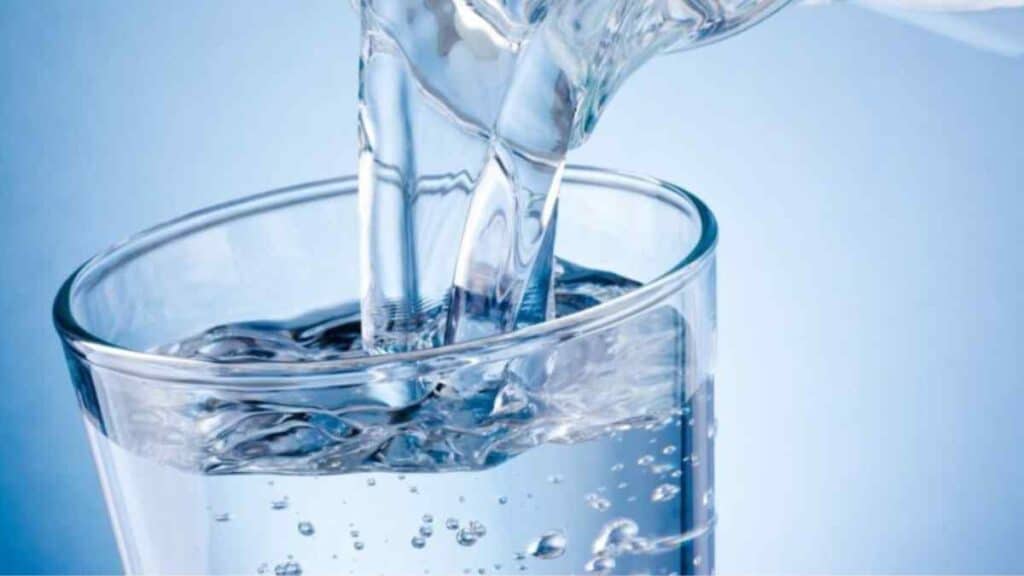
The Best Types of Water To Mix Baby Formula
You can use many types of water to mix with infant formula. If you’re afraid about water safety and unsure of what kind of water you should use in mixing for powder formula, here’s what you need to know:
Distilled Water
Distilled water is a type of purified water that has been boiled at high temperatures to remove any impurities. It’s used in preparing baby’s formulas because it has no trace of minerals, salts, or chemicals.
It is an excellent option for babies who have trouble digesting standard formula powder. It’s clean, pure water distilled from other sources, so it’s free of any impurities or contaminants. Babies are at higher risk for a severe bacterial infection that could cause illness or discomfort during formula feeding – especially babies with a weakened immune system and premature infants.
Distilled water is also an excellent choice for those who don’t like giving their children tap water from the public water system in mixing with powdered formula because it may contain lead or other harmful chemicals.
Purified Water
Purified water is a type of water that has been filtered and disinfected to remove any contaminants or impurities that could be harmful to your baby. It combines minerals, antioxidants, amino acids, vitamins, and proteins. It has no artificial flavors or colors and is made from purified water with added minerals.
It is designed to promote growth and development in infants. It also has a neutral pH balance that doesn’t interfere with the mineral content of breast milk or baby formula.
Boiled Tap Water
Boiled tap water is an excellent alternative to baby formula, but it should be boiled before being used in the same way you would sterilize baby bottles.
Boiling water kills bacteria and other microorganisms that might be present in your tap water. Bacteria can harm babies because they aren’t old enough to fight off infections, leading to illness or even death if left untreated. Boiling tap water makes it better to mix formulas. If you’re boiling water, ensure it reaches a full rolling boil.
Boiled tap water is especially good because it is free of chlorine and fluoride, which cause faint white lines on most babies’ teeth, commonly added to municipal water supplies.
If you are still determining if the tap water in your area is safe for preparing infant formula, contact your local health department or have your water tested as per the American Academy of Pediatrics (AAP) recommended.
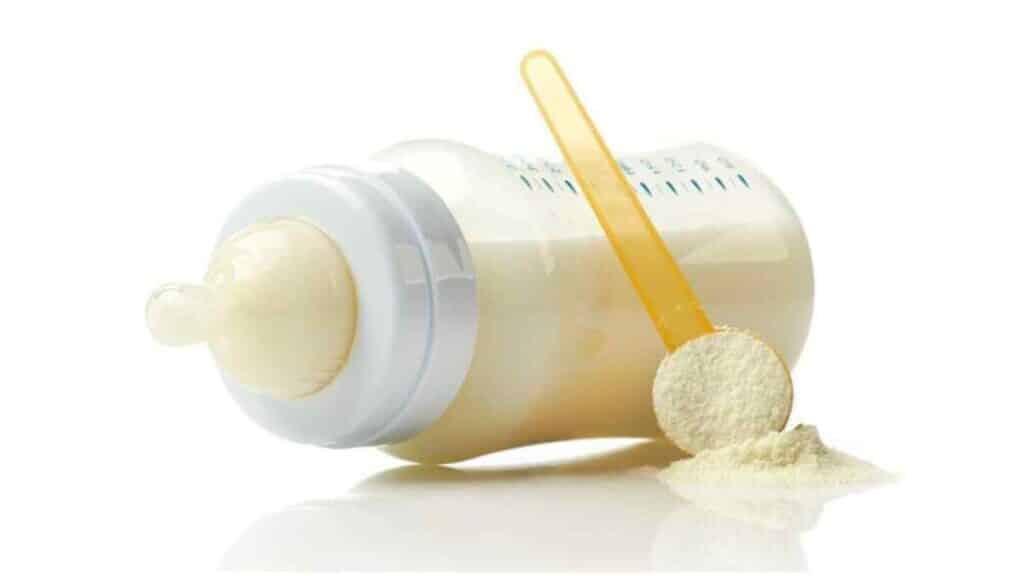
Is Fluoridated Water Safe to Mix For Powdered Infant Formula?
Fluoridated water is one of the most common additives in baby formula. It’s been a staple for decades, but is it safe? The short answer is no.
Fluoride is a chemical often added to water to make it safer to drink. But babies under 6 months old aren’t supposed to drink fluoridated water. It can cause them harm.
The American Dental Association recommends that parents not give their children fluoridated water because it has a high fluoride level that could cause staining on their teeth and lead to tooth decay. This is especially true for babies still breastfeeding since fluoride can pass through breast milk and be ingested by the baby.
There’s also some concern that too much fluoride can interfere with brain development in children under 3 years old.
The American Dental Association suggests checking with your local water company to make sure that the fluoride level is less than 0.7 parts fluoride per million parts water.
Can You Use Well Water for Homemade Baby Formula?
It’s a question that every new parent must ask themselves: is well water safe in making formula?
Well, the answer isn’t always simple. The truth is that some wells are safe and some aren’t, so the water quality depends on where you live.
But first things first: what makes a well unsafe? It’s not the water itself—this type can be perfectly fine for drinking or cooking, but that doesn’t mean it’ll work for baby formula. The problem lies in the source of your water supply. If you have a well and there’s any chance it could be contaminated by lead or chemicals, your baby could be at risk of exposure, especially for children with a weakened immune system.
That’s why the Environmental Protection Agency (EPA) says that well water should be tested before being used to prepare baby formula. This type of water can contain high levels of nitrates, naturally occurring chemicals that can be dangerous to infants under six months old.
If your well water has a nitrate concentration of more than 10 parts per million (ppm), or if you’re concerned about the safety of your water because your baby was recently diagnosed with the blue baby syndrome, then consult your pediatrician or health care provider before using your this type of water to prepare formula for your baby.
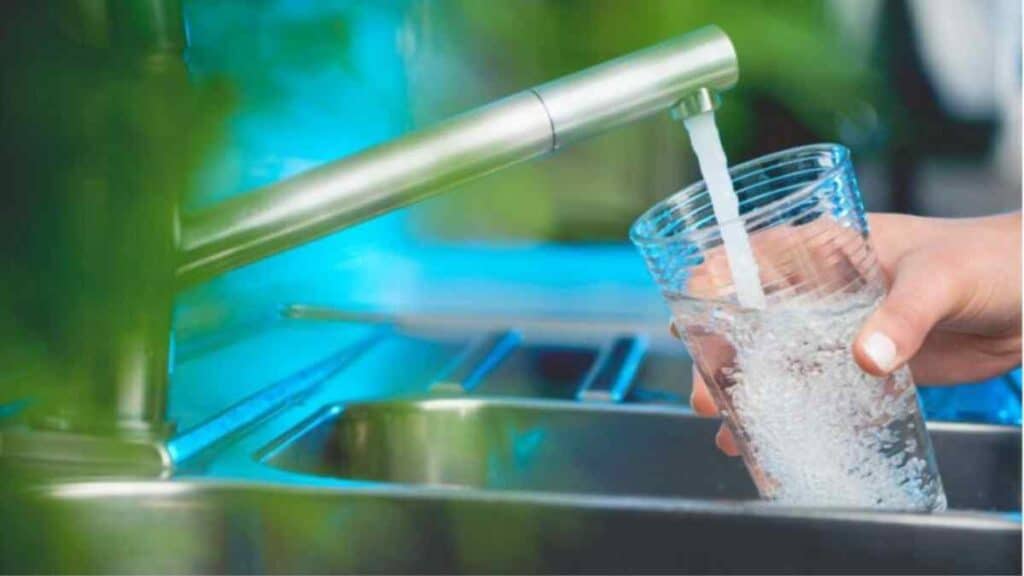
Should You Filter the Water From Your Tap?
There are many myths about whether or not you should filter the water from your tap. The truth is, it depends on where you live.
If you live in an area with hard water, it’s probably a good idea to filter it.
Hard water is high in minerals like calcium and magnesium, which can build up over time and cause issues with how clean your dishes are. Filter systems can help prevent this by removing the minerals from the water before it reaches your faucet.
On the other hand, if you have city water that comes from the underground safe water source and has been treated with chlorine, then it’s probably not necessary to filter it—unless, of course, you’re just worried about taste or don’t like having chlorine in your glass!
The bottom line? Check with your local municipality or county office to determine their water treatment system before deciding whether to filter your tap!
Is It Ok to Use Bottled Water for Formula?
Bottled water is an excellent option for baby formula, but you should always check to ensure it’s safe before using it.
1. Ensure the bottled water has been properly treated and purified.
This means it has undergone a series of steps—including filtration, deionization, and reverse osmosis—to remove potentially harmful contaminants from the water source.
2. Look at the label on the bottle.
Check the expiration date on the bottle. If there’s nothing, throw it out! It should have an expiration date and be labeled as “purified” or “distilled” water. If the label says nothing about purification or distillation, it likely hasn’t been purified and isn’t safe for baby formula!
3. Make sure it is “BPA free” or “BPA free plastic.”
BPA-free bottles are the safest option. BPA, or bisphenol A, is a chemical used in many products that can leach into food or liquid and be ingested by humans. It has been linked to health problems like cancer, diabetes, and reproductive issues. While there have been no studies on BPA leaching from plastic baby bottles, it’s best to err on the side of caution when it comes to what you put in your baby’s mouth.
If your child’s immune system is compromised or they were born prematurely, you may need to sterilize your baby’s bottles regularly. Ask your pediatrician if this step is necessary for your child.
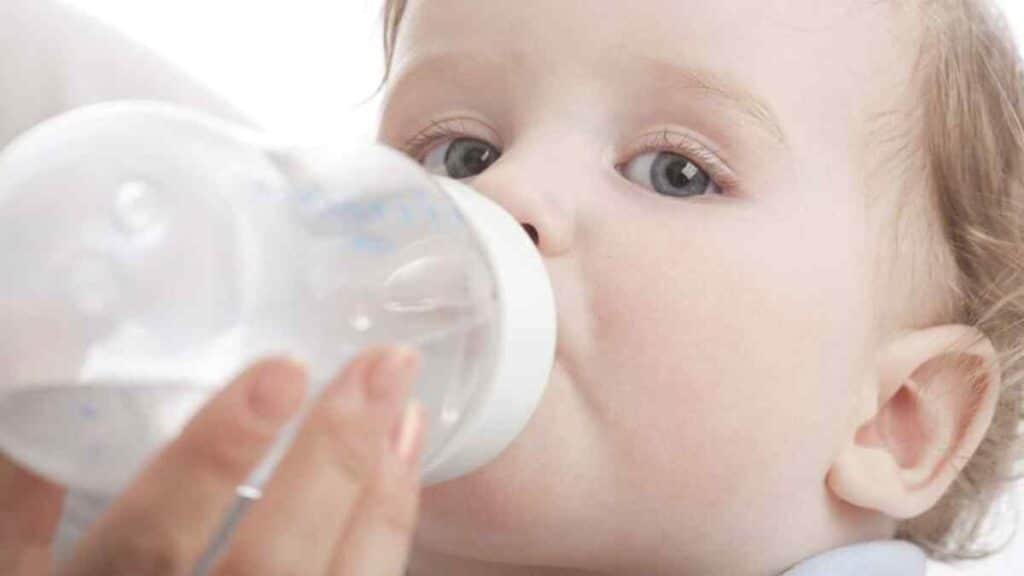
The Safety Of Bottled Water For Babies
As we previously discussed the different types of water for babies, including tap water, purified water, and distilled water, it’s essential to delve deeper into the safety of bottled water for babies. In this column, we will discuss the precautions that parents should take when using bottled water for babies, whether it’s for drinking or preparing infant formula.
Bottled water, a convenient and widely available option, comes in various forms, such as spring water, purified water, and distilled water. When choosing bottled water for your baby, it’s crucial to consider its source, mineral content, and fluoride levels.
While most bottled water is considered safe for babies to drink, it’s important to ensure that the brand you choose meets specific safety standards. Baby bottled water, also known as nursery water, is specially designed for infants, with low levels of fluoride and other impurities. When preparing infant formula or offering drinking water to your baby, opting for nursery water can be a wise choice.
For parents who prefer using purified bottled water for their babies, it’s vital to check the purification process employed by the brand. Look for water that has undergone a thorough purification process, such as reverse osmosis or distillation, to ensure that it’s free from harmful contaminants.

Spring water, another popular choice for bottled water, is sourced from natural springs and typically has a balanced mineral content. However, it’s essential to be cautious when using spring water for babies, as the mineral and fluoride levels may vary depending on the source. Always opt for low-fluoride spring water when choosing this type of bottled water for your baby.
One concern when using bottled water for babies is the potential for the presence of microplastics or other contaminants leaching from the plastic bottle. To minimize this risk, store bottled water in a cool, dark place, away from direct sunlight or heat sources. Additionally, avoid using plastic bottles that show signs of wear, such as cracks or cloudiness, as they may release harmful chemicals into the water.
When offering drinking water to your baby, it’s best to consult with your pediatrician to determine the appropriate age and amount. In general, babies under six months old should not drink bottled water, as their primary source of hydration should come from breast milk or infant formula. As your baby grows and starts consuming solid foods, your pediatrician can provide guidance on when and how much water your baby can drink.
Best Types Of Baby Water for Baby Formula
Gerber Pure Water
Gerber, a well-known and trusted brand in the baby products industry, offers purified water specifically designed for infants. Gerber Pure Water goes through a rigorous purification process and contains no added fluoride, making it a safe choice for mixing with baby formula or offering as drinking water.
Nursery Water
Nursery Water is another popular option for parents seeking safe water for their babies. This purified water contains a minimal amount of added fluoride, which can help protect against tooth decay while still being safe for infants. The brand also offers a fluoride-free option.
Aquawawa
Aquawawa is another product on the list made especially for baby formula. It’s also doctor-recommended, making it ideal if you want to prepare infant formula. It also comes in 8-ounce bottles which is convenient enough to bring anywhere you need purified or distilled water.
ABC Baby Water
The last on the list is ABC Baby Water for baby formula. It’s both purified and distilled, giving your baby a clean source of bottled water when they need it. ABC Baby Water is sourced from the purest mountain spring water before undergoing an 11-hour, 9-step distillation and purification process. These are also carefully packaged drinking water and don’t contain any excessive dissolved minerals that may cause adverse effects on your baby’s health.
How to Prepare and Store Baby Formula
Adding formula powder to cooled, boiled water is the standard way of preparing formula milk for a baby. But what are the rules about how long the formula milk can be kept for your baby? And what if my baby doesn’t finish all the formula milk?
To prepare the formula:
- Add the powder to cooled, boiled water.
- Shake well and test the temperature on your wrist. If your baby doesn’t finish all the formula, throw it away within 1 hour.
- If you need to prepare infant formula in advance, put it in the fridge within 1 hour of making it, and use it within 24 hours.
5 Easy Tips On Storing Bottled Water
If you’ve ever opened a water bottle only to find that it’s gone wrong, then you know how frustrating this situation can be. You want to save money and resources, but you also want to avoid drinking something that might make your baby sick.
The good news is that there are several things you can do to help keep your bottled water fresh for as long as possible:
1. Make sure that the bottle of water you use for formula feeding is sealed tightly after opening. This will prevent bacteria from entering the bottle and growing inside. You don’t need a bottle sterilizer, but do sterilize bottles and nipples by boiling them for 5 minutes before the first use.
2. Keep your bottled water in a cool place away from direct sunlight, as this could cause bacteria growth too.
3. Don’t store it next to other types of food or drink, as this may cause cross-contamination.
4. If your bottled water comes with an expiration date, ensure you use it within that period.
5. If you make your formula, check the instructions for what kind of water to use—it may differ from what you’d use for drinking.
Visit the Centers for Disease Control (CDC) website for more tips about washing your baby’s bottles and other feeding supplies.
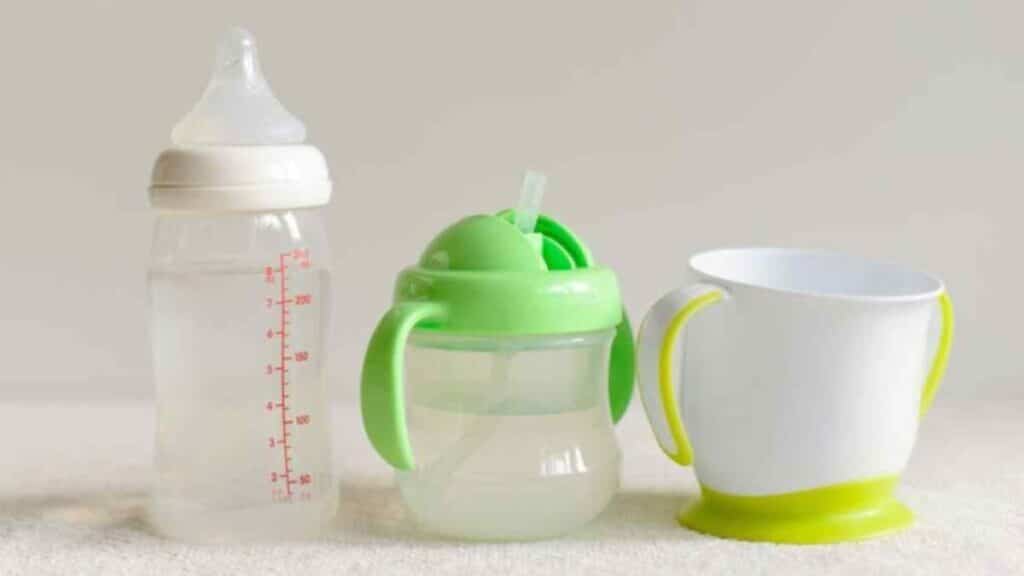
Criteria for Choosing the Best Packaged Drinking Water for Babies
Now that we’ve discussed the best types of baby water for preparing infant formula, it’s equally important to choose the right kind of water for your little one’s health and development. Let’s delve deeper into the criteria for selecting the best-packaged drinking water for babies, ensuring that you can make an informed decision when purchasing water for your baby’s needs.
Source of water
The source of water plays a crucial role in determining its quality and suitability for babies. Spring water, purified water, and distilled water each have distinct characteristics and come from different sources. Ensure that the water you choose comes from a reputable and protected source, free from contamination and environmental pollutants.
Purification process
Different brands of packaged drinking water undergo various purification processes, such as reverse osmosis, distillation, or UV treatment. When selecting water for making infant formula, opt for brands that use thorough purification methods to remove impurities, bacteria, and excessive minerals. Remember that boiling water is essential for formula preparation, regardless of the water source, to eliminate any potential contaminants.

Mineral content
The mineral content in packaged drinking water can significantly impact your baby’s body. Since babies have delicate systems, it’s essential to choose water with a balanced mineral content. Be cautious of soft water, which may contain high levels of sodium, and hard water, which may have excessive minerals. Fluoridated water is another aspect to consider, as additional fluoride can be detrimental to your baby’s dental health. Consult your pediatrician for guidance on fluoride supplements if necessary.
Packaging and storage
Packaged drinking water typically comes in plastic bottles or jugs, which can impact the water’s quality if not stored correctly. Ensure that the bottles are made from food-grade, BPA-free materials and store them in a cool, dark place away from direct sunlight or heat sources. Boiled water should be stored in clean, sterilized containers and used within a short period to maintain its safety for formula preparation.
Certification and safety standards
Lastly, always check the certification and safety standards of the packaged drinking water you choose for your baby. Reputable brands adhere to strict quality control measures and comply with regulations set by the FDA or other relevant authorities. Look for water that has been tested and certified to ensure that it meets the highest safety standards for your baby’s consumption.

Takeaways
It’s important to know that water is one of the most critical ingredients in baby formula. It makes up about 90% of the formula! That’s why choosing safe water for your baby is so important.
When deciding which water to use, you’ll want to look for one with no added fluoride or chlorine. Also, ensure it tastes good and has no weird aftertaste or odors. If you use filtered water from your tap, be sure to change the filter regularly, so it doesn’t affect the taste of your baby’s formula.
Did this article help you? If so, please let us know in the comments below. If you have any other questions, feel free to ask them in the comments as well!



